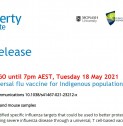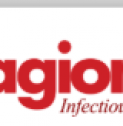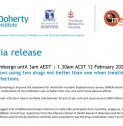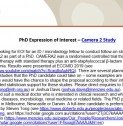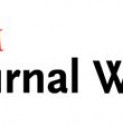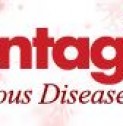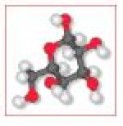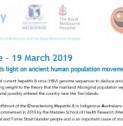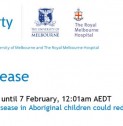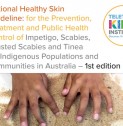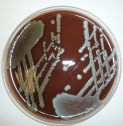Professor Steven Tong
Honorary fellow
Qualifications:
PhD, Charles Darwin University, 2010; Bachelor of Medicine and Bachelor of Surgery with Honours, University of Melbourne, 1998; Fellow Royal Australasian College of Physicians, 2006; Graduate Diploma Clinical Epidemiology, Newcastle University, 2010.
Approved level of HDR supervision at Charles Darwin University:
Associate Supervisor for PhD
Location:
Biography:
Professor Tong is an infectious diseases physician with research interests in infectious diseases affecting Indigenous people. He aims to combine clinical epidemiology with molecular genetic approaches to better understand the patterns and transmission of diseases due to agents such as Staphylococcus aureus, hepatitis B, and influenza.
He was the inaugural Northern Territory Fulbright Scholar and trained at Duke University, North Carolina in 2011. He was also a visiting scientist at the Wellcome Trust Sanger Institute for all of 2012.
He has established numerous collaborations with overseas laboratories as well as fellow clinician-researchers in Australia. He is currently co-leading an international multicentre randomised controlled trial of combination therapy for S. aureus bloodstream infections.
Prof Tong is affiliated with Menzies, the Victorian Infectious Disease Service, The Royal Melbourne Hospital, and the Doherty Department, University of Melbourne, at the Peter Doherty Institute for Infection and Immunity
- Bowen, A.C., Harris, T., Holt, D.C., Giffard, P.M., Carapetis, J.R., Campbell, P.T., McVernon, J., & Tong, S.Y.C. (2016). Whole genome sequencing reveals extensive community-level transmission of group A Streptococcus in remote communities. Epidemiology Infections, 144, 1991-8.
- Andersson, P., Harris, S.R., Seth-Smtih, H.M.B., Hadfield, J., O’Neill, C., Cutcliffe, L.T., et al. (2016). Chlamydia trachomatis isolates from Australian Aboriginal people with trachoma form distinct lineages. Nature Communications, 7,10688.
- Clemens, E.B., Grant, E.J., Wang, Z., Gras, S., Tipping, P., Rossjohn, J.,et al. (2016). Towards identification of immune and genetic correlates of severe influenza disease in Indigenous Australians. Immunology Cell Biology, 94, 367-77.
- Davis, J.S, Sud, A., O’Sullivan, M.V.N., Robinson, J.O., Ferguson, P.E., Foo, H., et al. (2016). Combination of vancomycin and β-lactam therapy for methicillin-resistant Staphylococcus aureus bacteremia: A pilot multicenter randomized controlled trial. Clinical Infectious Diseases, 62, 173-80.
- Tong, S.Y.C., Davis, J.S., Eichenberger, E., Holland, T.,& Fowler, V.G. (2015). Staphylococcus aureus Infections: Epidemiology, Pathophysiology, Clinical Manifestations, and Management. Clinical Microbiology Reviews, 28, 603-61.
- Tong, S.Y.C., Holden, M.T.G., Nickerson, E.K., Cooper, B.S., Köser, C.U., Cori, A., et al. (2015). Genome sequencing defines phylogeny and spread of methicillin-resistant Staphylococcus aureus in a high transmission setting. Genome Research, 25,111–8.
- Tong, S.Y.C., Schaumburg, F., Ellington, M.J., Corander, J., Pichon, B., Leendertz, F., et al. (2015). Novel staphylococcal species that form part of a Staphylococcus aureus related complex: the non-pigmented S. argenteus sp. nov. and the non-human primate associated S. schweitzeri sp. nov. International Journal of Systematic and Evolutionary Microbiology, 65, 15-22.
- Bowen, A.C., Tong, S.Y.C., Andrews, R.M., O'Meara, I.M., McDonald, M.I., Chatfield, M.D., Currie, B.J., & Carapetis, J.R. (2014). Short-course oral co-trimoxazole versus intramuscular benzathine benzylpenicillin for impetigo in a highly endemic region: an open-label, randomised, controlled, non-inferiority trial. Lancet, 384, 2132-40.
- Davies, J., Littlejohn, M., Locarnini, S.A., Whiting, S., Hajkowicz, K., Cowie, B.C., Bowden, D.S., Tong, S.Y., & Davis, J.S. (2013). .The molecular epidemiology of hepatitis B in the Indigenous people of northern Australia. Journal of Gastroenterology and Hepatology Foundation, 28, 1234-41.
- Flint, S.M., Davis, J.S., Su, J.-Y., Oliver-Landry, E.P., Rogers, B.A., Goldstein, A., et al. (2010). Disproportionate impact of pandemic (H1N1) 2009 influenza on Indigenous people in the Top End of Australia’s Northern Territory. Medical Journal of Australia, 192, 1-6.
-
The Australian | Hit Covid fast: antiviral drugs to keep infected out of hospital
The nation’s top doctors predict new antiviral treatments to fight Covid-19 will make the disease significantly more manageable and ensure the hospital system can easily cope with any future spike in post-lockdown cases.
-
Researchers edge closer to better flu vaccine for Indigenous people across the world
The research was a collaboration between the Doherty Institute, Monash Biomedicine Discovery Institute, Menzies School of Health Research and CQUniversity.
-
Towards a universal flu vaccine for Indigenous populations
Researchers have identified specific influenza targets that could be used to better protect Indigenous people from experiencing severe influenza disease through a universal, T cell-based vaccine.
-
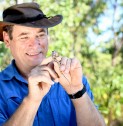
CDU academics named among world’s most influential
Menzies School of Health Research Professor Bart Currie, Professor Anne Chang AM, Professor Ric Price, Associate Professor Steven Tong, Professor Nicholas Anstey, Professor Joshua Davis, Professor Alan Cass, Professor Peter Morris and Professor Amanda Leach
-
An open letter from 119 scientists and researchers to The Lancet
Signed by clinicians, medical researchers, statisticians, and ethicists from across the world, follows the publication of a paper on using hydroxychloroquine or chloroquine for the treatment of COVID-19.
-
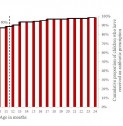
Antibiotic use in remote communities contributing to the burden of disease
A study of antibiotic prescription rates for Aboriginal children in remote communities in the Northern Territory (NT) has identified high rates of infections and antibiotic use in these communities.
-
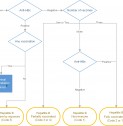
Innovative data use an important step in eliminating hep B
A team of researchers in the Northern Territory (NT) have designed and tested a new algorithm to determine hepatitis B status.
-
CAMERA2: Standard MRSA treatment does not outperform combination therapy
Standard treatment for Methicillin-resistant Staphylococcus aureus (MRSA) infection is not more efficacious than combination therapy, according to new research published in JAMA.
-
Trial shows using two drugs not better than one when treating MRSA blood infections
Researchers attempting to improve the treatment for methicillin-resistant Staphylococcus aureus (MRSA) blood infections have discovered the combination of two antibiotics was no better than one, and led to more adverse effects.
-
Trial shows using two drugs not better than one when treating MRSA blood infections
Researchers of methicillin-resistant Staphylococcus aureus (MRSA) blood infections say combination of two antibiotics was no better than one.
-
PhD Expression of Interest | Camera 2 Study
We are looking for EOI for an ID / microbiology fellow to conduct follow-on studies from CAMERA2 as part of a PhD.
-
An urgent need for antimicrobial stewardship in Indigenous rural and remote primary health care
The Coordinated Remote AntiMicrobial Stewardship (CRAMS) Group is funded by HOT North (Improving Health Outcomes in the Tropical North).
-
The winner takes it all for S. aureus
The CAMERA2 study, executed in multiple countries addressing the question whether addition of a beta-lactam antibiotic (7 days) improves outcome in patients with MRSA bacteremia.
-
Two New Trials of Combination Therapy for MRSA Bacteremia
The CAMERA2 study, just presented by Steven Tong at the European Congress of Clinical Microbiology and Infectious Diseases (ECCMID)
-
Contagion® to Report on the ECCMID Conference in Amsterdam
Steven Y. C. Tong, PhD, with the Menzies School of Health Research in Darwin, Australia, will speak about the results of the CAMERA2 trial on combination antibiotic therapy for methicillin-resistant Staphylococcus aureus bacteremia.
-
Hepatitis B DNA Helps Trace History and Movement of First Australians
The team found that hepatitis B virus isolated from these Aboriginal Australians is a unique strain called HBV/C4, which is not found anywhere else in the world.
-
Hepatitis B virus sheds light on ancient human population movements into Australia
Australian researchers have used current hepatitis B virus (HBV) genome sequences to deduce ancient human population movements into Australia, adding weight to the theory that the mainland Aboriginal population separated from other early humans at least 59 thousand years ago and possibly entered the country near the Tiwi Islands.
-
Eliminating skin disease in Aboriginal children could reduce antibiotic use by almost 20%
A study has revealed that 95 per cent of children in five remote Aboriginal communities had received an antibiotic prescription before their first birthday and almost half of them had received up to six prescriptions.
-

Building genomics expertise in the NT
Menzies is investing and developing expertise in the emerging research area of genome sequencing. In the past year, we took the lead in a number of national and international collaborative programs investigating the genomics of tropical pathogens, and...
-
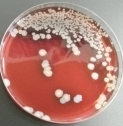
Bendigo Advertiser | Pain free staph fix given green light
Menzies School of Health Research (Menzies), findings show there has been inaccurate reporting of resistance to the recommended antibiotic, trimethoprim- sulfamethoxazole (Bactrim).
-

Pain free golden staph treatment cleared for use in remote communities
A northern Australian research team has provided reassuring support for the continued use of an oral treatment option for patients with skin infections, finding that there has been inaccurate reporting of resistance to the recommended antibiotic.
-
National Healthy Skin Guideline
-

Developing Northern Australia 2017 Implementation Report
Page 20 - Case Study | The Australian Government funded HOT NORTH project has hit the ground running in 2017, and is building north Australia’s expertise and capacity in tropical medicine through research projects that will transfer new knowledge to communities.
-

E-news Healthy Tomorrow - Hot North Pilot Projects
The first six pilot projects have been funded to help close critical gaps in health outcomes in northern Australia and the Asia-Pacific region as part of the unique collaborative program Improving Health Outcomes in the Tropical North (HOT NORTH), led by Menzies. Twelve pilot projects per year will be supported by HOT NORTH.
-

Associate Professor Steven Tong honoured with Frank Fenner Award
Associate Professor Steven Tong, Infectious Diseases Physician at the Royal Melbourne Hospital and Indigenous Health Theme Leader at the Peter Doherty Institute for Infection and Immunity (Doherty Institute), has been awarded the 2017 Frank Fenner Award for Advanced Research in Infectious Diseases.
-
Defeating serious MRSA infections using an everyday drug that shouldn’t work
A new drug combination is the first step towards improving treatment of drug resistant golden staph (MRSA) - a breakthrough that could potentially save hundreds of lives, every day.
-

A new strain of Hepatitis B found in the Northern Territory
Researchers say a unique strain of Hepatitis B found only in the Northern Territory could be a main contributor to the high rates of liver cancer found in Aboriginal people.
-
‘Golden staph’ three species, not one
'Stories of Australian Science' magazine
-

Researchers discover a new silver species of Staphylococcus
Scientists from a pioneering Northern Territory-based research project have uncovered two new species of staphylococcus. One of the two has been officially registered as Staphylococcus argenteus, or more commonly Silver Staph.
-
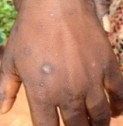
Pioneering skin sores research to improve health of children globally
A NT-based research project investigating alternative and more practical treatments for skin sores is set to benefit the millions of children worldwide who suffer from this infection.
-

NHMRC project snapshot: Dr Steve Tong
Menzies' Post-doctoral Research Fellow Dr Steve Tong was recently awarded a competitive grant and a fellowship as part of the National Health and Medical Research Council's yearly multi-million dollar funding round.
-
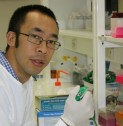
NHMRC fellowship snapshot: Dr Steve Tong
Menzies' Post-doctoral Research Fellow Dr Steve Tong was recently awarded a competitive grant and a fellowship as part of the National Health and Medical Research Council's yearly multi-million dollar funding round.
-

Developing global links in the fight against a super-bug
For years it's been the super-bug in hospitals around Australia. Golden staph, or Staphylococcus aureus, is resistant to a wide range of antibiotics, difficult to treat and seemingly impossible to eradicate. Golden staph is one of the most aggressive...
-

2011 Fulbright Northern Territory Scholar
Menzies researcher Dr Steven Tong has been awarded a prestigious Fulbright Scholarship for his critical research into golden staph, a major cause of severe community and hospital acquired infections.




